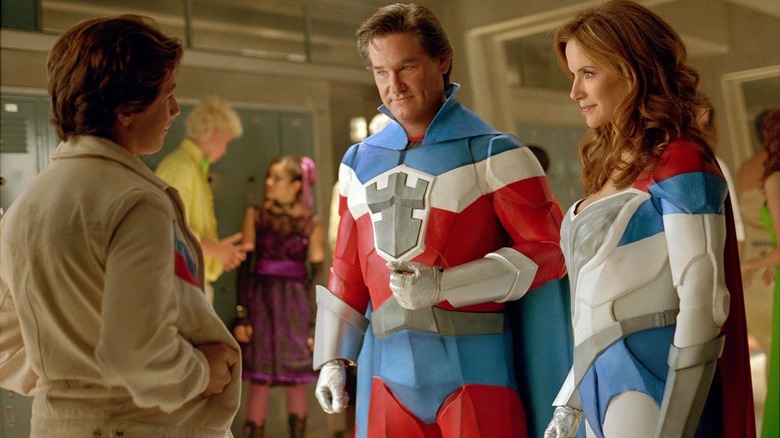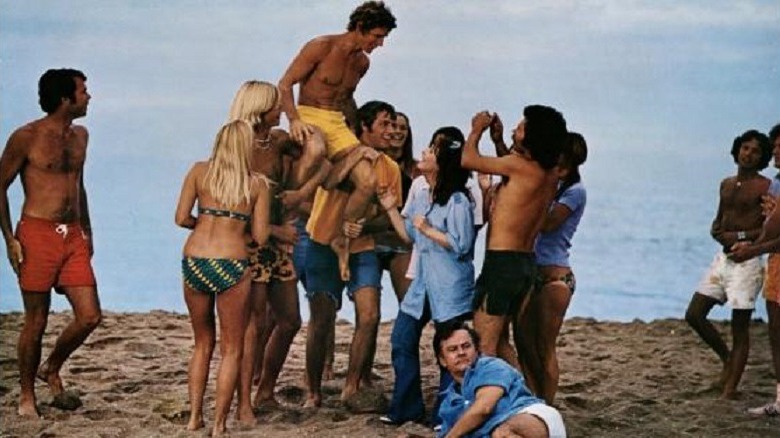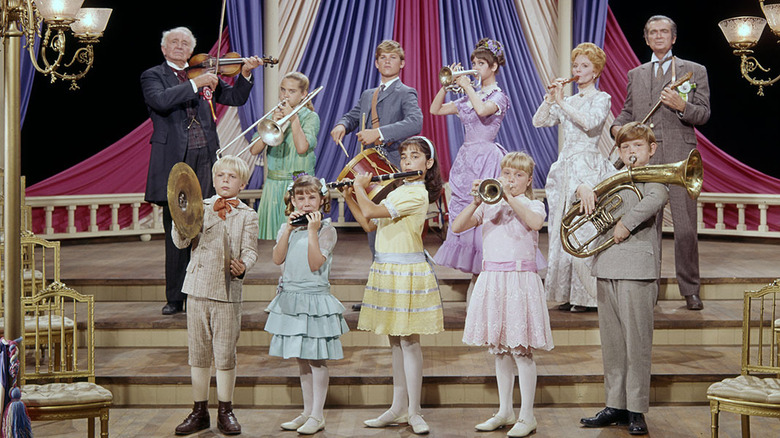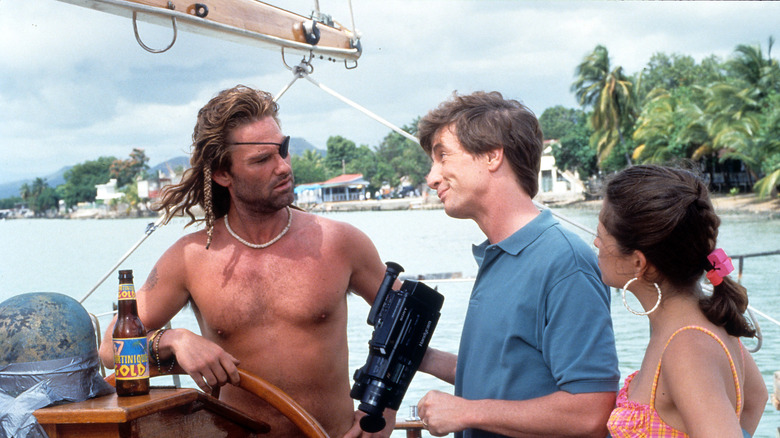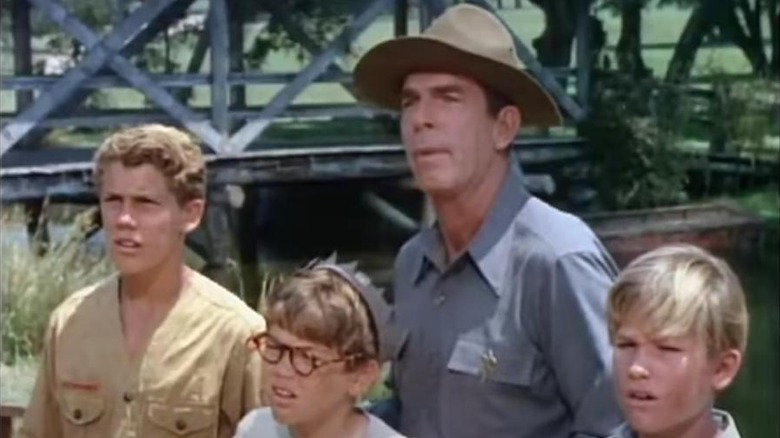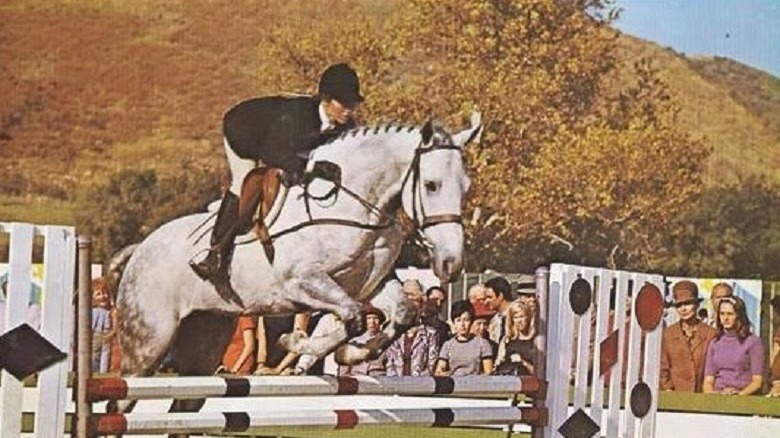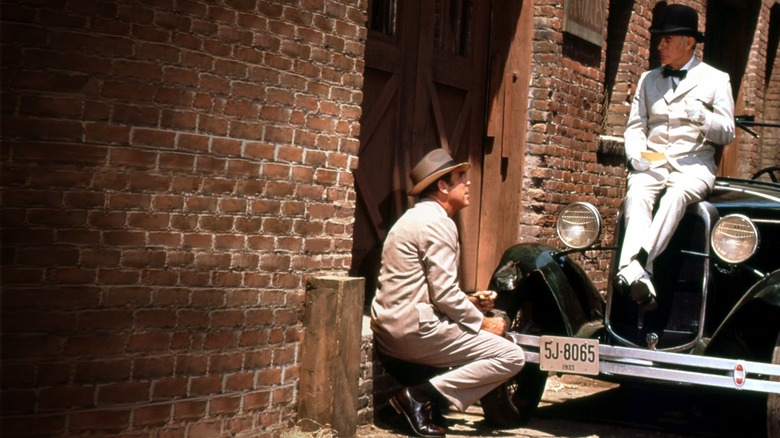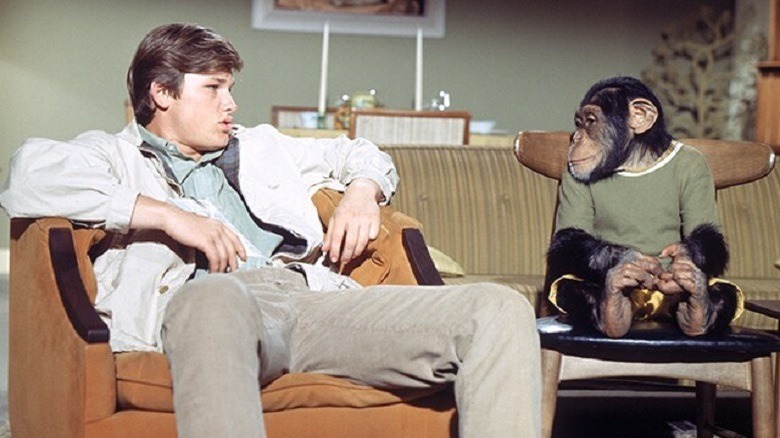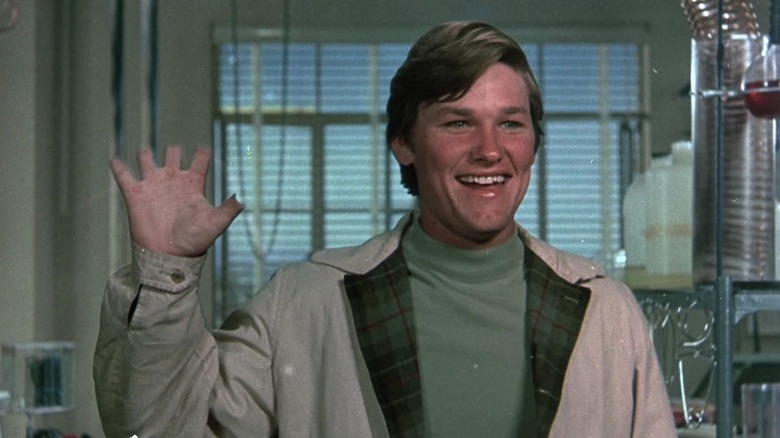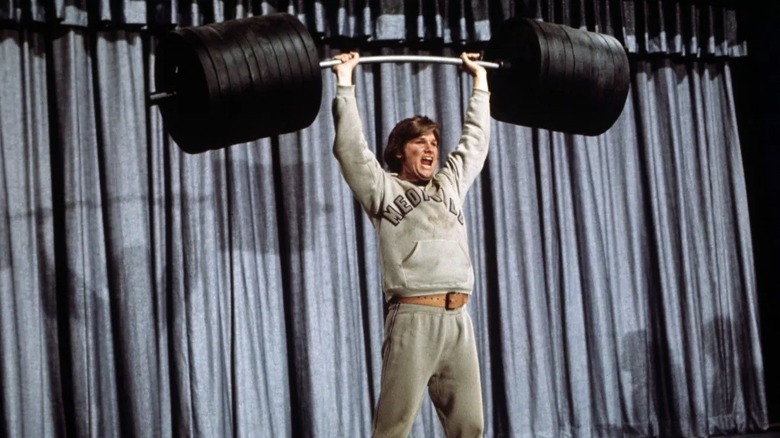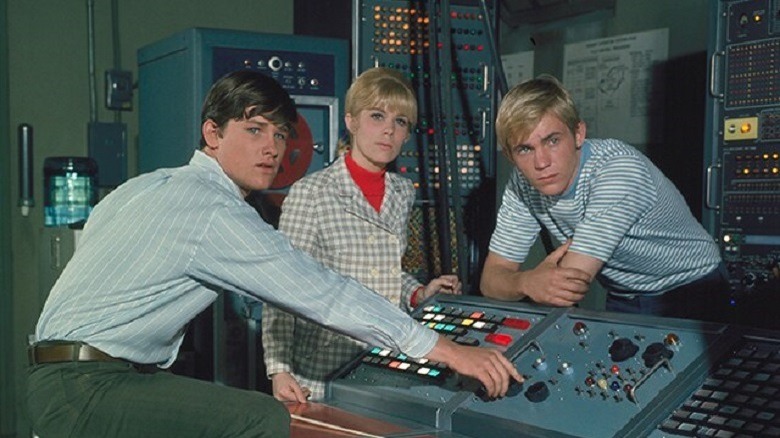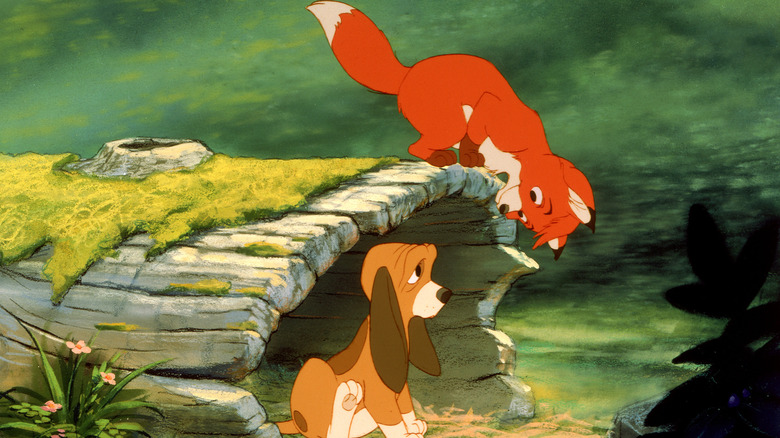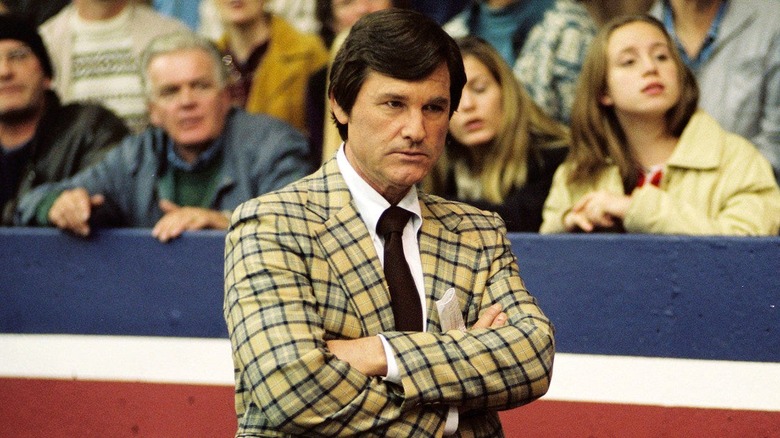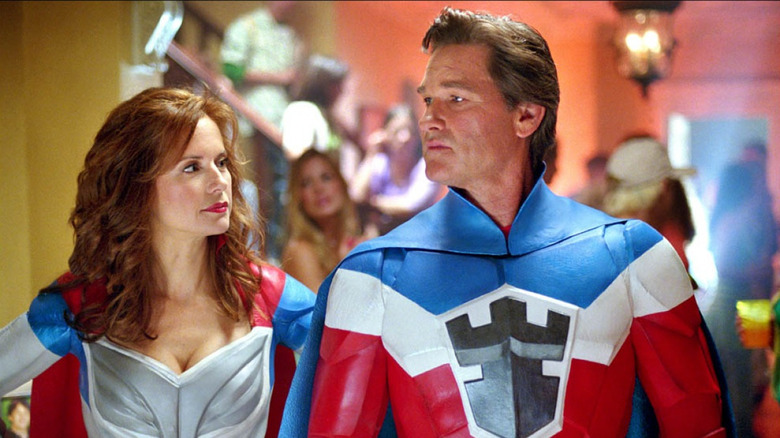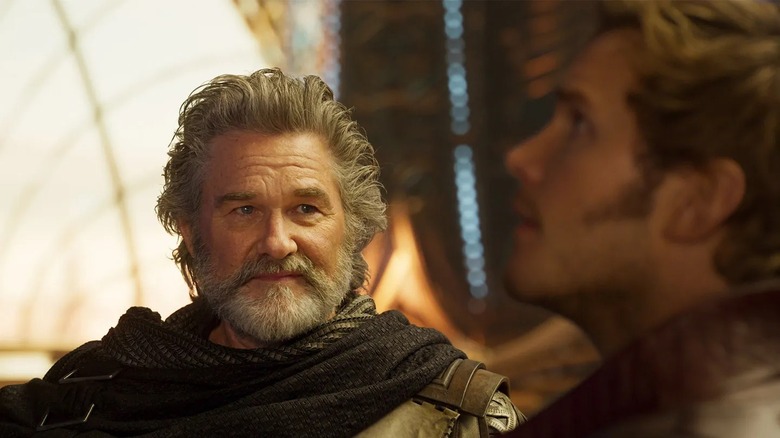Every Kurt Russell Disney Movie, Ranked
That Kurt Russell is one of our finest actors should go without saying, but it's almost more important to applaud him specifically because his career began in a place that hasn't always fostered long-term success for young actors: Disney. Although the House of Mouse and its related studios often feature plenty of opportunities for young and talented actors (think Lindsay Lohan or Shia LaBeouf), those same actors can struggle professionally and personally when they try to grow beyond their Disney years. The same is absolutely untrue for Russell, who became one of the most reliable and enjoyably sly action stars of the 1980s and 1990s, serving as a welcome on-screen presence in everything from "The Thing" to "Big Trouble in Little China" to "Breakdown." But Russell has also appeared in a jaw-dropping number of Disney productions; when you count titles from both Disney proper and studios like Marvel and Touchstone, he's been in 14 of their films. Today, let's rank them.
14. Superdad
For various reasons, "Superdad" is not a movie people hold up as a secret classic among the 70s-era live-action comedies released by Walt Disney Pictures. The title alone accurately would lead you to believe that Russell is not the lead; instead, he plays the boyfriend of the titular character's daughter, a young man whom the film's "superdad" (played by Bob Crane) does not approve of. The title would also suggest that the film has some supernatural elements, but that's not the case; instead, "Superdad" is a simple slapstick-y comedy about a dad unable to let his daughter grow up beyond his clutches, and his desperate attempts to keep her close to home and think he's a lot cooler than he is. Considering that Crane — best known for both starring in "Hogan's Heroes" and some very un-Disney-like personal preferences that may have led to his death in 1978 — is the lead, it's no shock that "Superdad" is nowhere to be found on Disney+. It's an act of mercy.
13. The One and Only, Genuine, Original Family Band
It is sheer and delightful coincidence that Russell and his wife Goldie Hawn both appeared in the 1968 musical "The One and Only, Genuine, Original Family Band," with the latter making her big-screen debut as (perhaps fittingly) a "Giggly Girl." (The well-known couple wouldn't get together until the mid-1980s.) That's one of the few fun facts about this genuine, original film, which is set amidst the 1888 presidential election, depicting a young romance between two families who hold different political beliefs, but also including a bevy of original songs from the Sherman Brothers (who were a few years removed from the massive success of "Mary Poppins"). This movie is far from political, though it depicts a period of Westward Expansion that was (in reality) fraught with differences among pioneers. Russell is one of the youngest kids in the film, not even serving as half of the core romance. Instead, his presence just is a reminder that Russell would eventually represent a modern style of acting beyond Disney, as the more stilted style of the rest of the "Family Band" ensemble doesn't quite fit in.
12. Captain Ron
If you want to see a hilarious bit of comedy between the irrepressible comedian Martin Short and Kurt Russell, you should watch the outtakes from the 2004 film "Jiminy Glick in LaLaWood," wherein Russell is simply unable to contain his delighted laughter at the antics of Short-as-Glick. (It's to the point where Short is visibly chuckling, which is something awfully rare when he's playing Glick.) Though both Short and Russell are perfectly capable at playing big in comedies, the combination of their energies in the 1992 film "Captain Ron," distributed by Touchstone Pictures, just doesn't work very well. Short is called upon to play a more henpecked, straight-man type opposite Russell as a gregarious, apparently one-eyed yacht captain whose wild ways end up allowing Short and his nuclear-family unit to grow and bond over a zany vacation. Each actor can do what they're asked to here, but there was so much evidence (even before that Jiminy Glick clip) of how funny the two men could be, so "Captain Ron" just feels like a feature-length missed opportunity.
11. Follow Me, Boys!
It should not surprise anyone to learn that Walt Disney Pictures made a movie about the Boy Scouts, an ode to the group and the American ideals its Scoutmasters taught to the impressionable youth of the country. These days, the 1966 film "Follow Me, Boys!" is not held up extremely high among live-action fare from Disney, less because it's straight-up bad and more because its old-fashioned story has only grown more antiquated over time. Instead, if people know the movie, it's for the fact that it arrived in theaters literally two weeks before Disney himself passed away, and because it served as the first of many films in which Kurt Russell would appear for the studio. Here, he plays a troublemaker who turns good thanks to the kindly ways of Lem Siddons (Fred MacMurray, in one of many Disney film appearances of his own). Lem's arc is a Scout version of the mid-90s Disney-adjacent inspirational drama "Mr. Holland's Opus," as both films depict a decades-long journey for its lead character and a gradual realization of the vast impact they've had on so many kids over a tumultuous period of 20th-century American history. For the historical-curio value of seeing Russell in his first Disney movie (though not his actual debut), this one's worth checking out, but can otherwise be skipped.
10. The Horse in the Gray Flannel Suit
Before he could run, Kurt Russell had to, metaphorically, walk. A year before he would become a constant leading-man type in Disney movies, he appeared in the other type of common role that befit him in these films: a supporting love interest to the daughter of a leading man. In the 1968 comedy "The Horse in the Gray Flannel Suit," that means he's playing a young man besotted with Helen, the daughter of an advertising executive (Dean Jones, another Disney Legend). The ad exec, though, has enough problems on his plate, having to come up with a cool new ad campaign for indigestion medication and appeasing his horse-loving daughter. Title aside, this film is sadly not about a Mr. Ed-like horse who starts blowing people away with his Don Draper-esque ad pitches, just a decade-late riff on the title of "The Man in the Gray Flannel Suit." And for fans of Russell, "The Horse in the Gray Flannel Suit" is a limited affair as well, as he's only in so much of the end product (though he at least proved he could convincingly be the charming boyfriend if called upon).
9. Charley and the Angel
Even years after the passing of Walt Disney, it was a safe bet that Fred MacMurray would show up in a live-action film or two from the studio. In fact, the 1973 film "Charley and the Angel" served as his very last film for Disney, and it's an odd one to be sure. Even with Russell playing a potentially untrustworthy young man dating the lead character's daughter, the story is largely about MacMurray's character Charley and a crusty old angel played by Harry Morgan in this Depression-era story. The fancifully supernatural plot is meant to enable Charley to become a better person in his twilight years, but it's also another fusty vehicle in which lots of lengthy slapstick involving cartoonish bad guys occurs. Films like this don't quite lean on Russell, but his stalwart presence, like that of MacMurray, at least makes this feel quintessentially Disney, if not actually good.
8. The Barefoot Executive
Disney was always a little late to the party when it came to slyly satirizing trends in culture, as was the case with this 1971 comedy set in the world of network television. "The Barefoot Executive" does feature Russell as the leading man, a mailroom worker named Steven Post who finds his star rising at the network when he appears to have a preternatural ability to predict the success or failure of its news shows. In reality, it's because Steven is fortunate to be paired with a chimpanzee named Raffles, who is effectively attuned to what does or doesn't work on the small screen. (Paddy Chayefsky and "Network," eat your heart out.) "The Barefoot Executive," like any of the other man-and-animal comedies from Disney, is unavoidably, gleefully ridiculous, but it at least is aware of its low-scale aims and doesn't attempt to be anything other than a truly silly comedy with vulgar intentions.
7. Now You See Him, Now You Don't
Each of the Dexter Riley movies basically asks "What if the lead character got X superpower?" In the first film, "The Computer Wore Tennis Shoes," the power is super-intelligence. In the 1972 sequel, "Now You See Him, Now You Don't," it's (obviously) invisibility. But even the details beyond that set-up question are very much the same in this sequel as they are in the 1969 original film. Once again, the film is set in and around Medfield College; once again, the college is on the brink of collapse; and once again, Dexter and his antics will be what saves the college to live for another year in spite of more machinations from the gangster played by Cesar Romero. That films such as "Now You See Him, Now You Don't" are irretrievably silly is baked in; still, it's difficult to watch these films and not wonder if the people making them are the same as dismissive critics who assume that Disney movies are always for kids, and thus are not worth thinking about for too long. "Now You See Him, Now You Don't" was also the first Disney film that would eventually air in full on television over a two-hour timeslot; previous movies (including some animated films) had been split into two hour-long chunks over two weeks. That's worth noting because these titles feel like they were only ever made for small-screen half-life, in spite of Russell's undeniable charm as the lead. You can see why and how he would parlay these films into a longer and more fruitful future, but you can also see why people like Quentin Tarantino would denigrate such films decades down the line.
6. The Strongest Man in the World
In 1975, the Dexter Riley trilogy arrived at its inevitable conclusion — because if the first two films depicted the young collegian getting very smart and then invisible, what would be next aside from super-strength? Much of the cast from the previous films returns in "The Strongest Man in the World," including the late Joe Flynn as the hapless Dean of Medfield College, as well as Cesar Romero as a nefarious gangster and, of course, Russell as the upbeat hero. They're joined this time by iconic comedian Phil Silvers, who chews as much scenery as is left over from the other over-the-top adult actors, as Dexter uses some special cereal to turn himself into a He-Man, and again, logic is not the strong point of these movies. As always, Russell is very game as Dexter, even though he's meant to be very even-keeled in spite of his unique powers. To watch "The Strongest Man in the World," and really any of the films in this lo-fi trilogy, is to be amazed now that someone as polished and seemingly squeaky-clean as a young Kurt Russell could turn into such a richly complex genre performer, because the clues aren't really present.
5. The Computer Wore Tennis Shoes
In some ways, to look at the films that Kurt Russell made with the Walt Disney Company is to look at a microcosm of how Disney itself morphed over time. It wasn't really until the arrival of Michael Eisner and Jeffrey Katzenberg in the mid-1980s that Disney expanded its reach beyond making one animated film every few years and punctuating that with mostly low-budget, very silly live-action comedies typically (but not always) peopled with older actors, fresh-faced newcomers, and a whole lot of slapstick. Sometimes, though, the youngsters would be front and center, as was the case with the Dexter Riley trilogy of the late 1960s and mid 1970s. Though Russell had appeared in a couple of other Disney films in the 1960s, it was movies like "The Computer Wore Tennis Shoes" that kickstarted his young fame. In this film, set at the same college where "The Absent-Minded Professor" took place, Dexter becomes a human super-computer after receiving an electric shock via lightning. (Once more with feeling, logic is not one of the strong suits of these films.) The stakes here are low and very much of the era, as the college's initial concerns involve not having enough money to pay for literally one computer. If nothing else, "The Computer Wore Tennis Shoes" boasts a scenery-chewing performance from Cesar Romero, who knows exactly what kind of movie he's making.
4. The Fox and the Hound
Here's a fun fact for you at your next pop-culture trivia night: the Disney animated film "The Fox and the Hound" opened on the same day in U.S. movie theaters as "Escape from New York." As you'll see from the rest of this list, it's not as if Russell would entirely forgo making films from Walt Disney Pictures moving forward, but it's also easy to look at this wildly disparate 1981 double feature as a sign of the actor's choice to mature and grow beyond his quaint beginnings. And the 1981 film "The Fox and the Hound" is exceedingly quaint, depicting the genuinely odd-couple friendship between a young hound named Copper and a red fox named Tod. The odd-couple pairing extends to the voice cast, too; Russell voices Copper once he's grown up, while Mickey Rooney voices the adult version of Tod. The film itself was a relatively acrimonious production, with a subset of animators staging a walkout a couple years prior to its release due to creative issues. Overall, "The Fox and the Hound" has some effective set pieces, including a climactic battle with a bear, but feels like the true end of an era for Disney, just as it was for Kurt Russell.
3. Miracle
With the exception of the aforementioned "Captain Ron" from Touchstone Pictures, it had been more than 20 years since Kurt Russell had appeared in a film from the Walt Disney Company when he took the lead role of real-life hockey coach Herb Brooks in the 2004 sports drama "Miracle." By this point, it wasn't just that the actor had changed, but also Disney itself. Gone were the sports-adjacent movies with football-playing donkeys (as in the 70s-era "Gus") or dogs who play basketball because the rule-books don't forbid it. "Miracle" was the natural extension of films like "Remember the Titans," taking real-life inspiration from the kind of sports story that brings a tear to your eye and a swell to your heart. And "Miracle" was a depiction of one of the greatest American sports stories of all time, retelling how the U.S. Olympic men's ice hockey team staged a gold medal upset over the Soviets at the height of the Cold War, leading to the iconic Al Michaels call that inspired the film's title. Director Gavin O'Connor is not, perhaps, making the edgiest film here, but "Miracle" is in many ways the quintessential hockey movie, creating conflict, staging tense moments, and delivering on its heroic conclusion, all with Russell anchoring the film with his firm and straightforward performance. It's one of his finest pieces of work to date.
2. Sky High
Some movies are just a little ahead of their time, especially when it comes to superheroes. The 2005 summer comedy "Sky High" is one of those titles, overall, arriving a few years before the onslaught of the Marvel Cinematic Universe but still tackling the concept of superheroics in clever, cute fashion. Here, Russell plays Steve Stronghold, better known as the Commander, a picture-perfect hero who, along with his wife (the late Kelly Preston), is one of the big city's most beloved superheroes. But the Commander is a supporting player, as the film's title is also the name of the high school where Steve's son (Michael Angarano) starts learning how to be either a hero or a sidekick, all while fending off a mystery baddie with an axe to grind. Though "Sky High" is not as effective as the previous year's Disney-backed superhero film, "The Incredibles," it boasts a remarkable supporting cast (Dave Foley and Kevin McDonald from the Kids in the Hall, Bruce Campbell, Lynda Carter, and Mary Elizabeth Winstead in one of her first roles) and a sly streak that's a lot of fun 20 years later.
1. Guardians of the Galaxy Vol. 2
As he's entered into his elder-statesman years, Kurt Russell has played fewer leading roles and more vital supporting parts. (His work in Tarantino's "Death Proof" is arguably the exception that proves the rule.) One such critical supporting role came in the 2017 Marvel film "Guardians of the Galaxy Vol. 2," which is just another sign of how far Disney has come as a studio and conglomerate; the young man who starred in the Mouse House's '70s-era live-action comedies could now play a boisterous, charismatic, yet terrifying character who wasn't the strongest man in the world, but was literally a living planet. Considering how Chris Pratt's Peter Quill idolized '80s-era pop culture in the film, it stands to reason that his dad would be played by Snake Plissken. But as Ego the Living Planet, Russell is effectively disturbing as we gradually realize the extent not only of his powers but also of how power-hungry the villain is. It helps that Russell is just one part of a James Gunn-directed ensemble, but "Guardians of the Galaxy Vol. 2" does an excellent job of highlighting the actor's capabilities to look like a jolly old soul while also behaving in truly heinous fashion.
